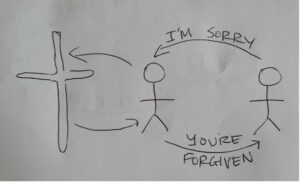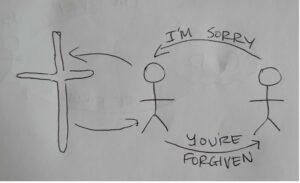With the celebration of Easter concluding the last day of the month and with many fully involved in Lent, I’ve had a word in my heart for a few weeks. The Christian celebration of Easter highlights the death, burial, and resurrection of Jesus Christ, giving Jesus the authority and power in Heaven and Earth over death and sin. He has the power to erase, restore, and forgive sins. The Bible plainly says, “If we confess our sins, he is faithful and just to forgive us our sins, and to cleanse us from all unrighteousness” (1 John 1:9). Forgiveness is such a special word to the entire story of Easter. But, what about when forgiveness is our responsibility? What about when someone offends us?
It seems to me, the modern definition of forgiveness says something like this, “If someone says I’m sorry, a magical eraser appears. You are required to forget every wrong they have done, and you are to accept them openly and willingly back into your life.” The words of that definition may be too long to read, so I’ve broken it down into three parts.
- An Offender says “I’m sorry.”
- The Offended party must forget everything that happened.
- The two parties must restore everything together the way it was.
Jesus had much to say on the subject of forgiveness; it was one of His main topics of discussion. At one point, Peter asks Him how many times we should forgive another person. Jesus gave him a math equation in response: 70 X 7. I laughed one time at a preacher who told me his deacon only had 453 more times before he could be finished with him. Somehow, I think he missed the point of what Jesus meant.
Jesus speaks of the word with such simplicity. I think it is our desire to see it so simply. Like, the person who wronged us just bows their head, says the magic combo, and boom we are instantly restored to a place of peace like offenses never happened. Is it even possible as a human to forgive that easily?
In some cases, forgiveness is that simple. Someone cuts you off in traffic, waves a hand in your direction to show their apology, and you both understand and forgive. Someone spills something in your house, they apologize, help you clean up, and both of you move on.
Enter Fred. Fred came to me with a problem. He was a Christian, he was living in victory, and trying to follow God with his whole heart. There was only one problem, Fred couldn’t forgive his uncle. Fred’s uncle had molested and abused him repetitively during his childhood years. He was serving a prison sentence because of it. Fred was torn to pieces. How could he, a Christian, victoriously follow Jesus and still deal with the bitterness in his heart over his uncle’s offense?
I asked Fred how he believed that God forgave him. Fred said a definition which pretty much sums up the gospel. He replied, “I told God I was sorry, and God forgave me of my sins.” “Wonderful!”, I told him, “That is exactly the definition of forgiveness!” He asked, “But, how can I do the same thing for my uncle and move on with my life?”
I shared with Fred the actual transaction of forgiveness which took place when he found the forgiveness of Christ. When we say, “I’m sorry,” God does not examine us and see if we are worthy of forgiveness. God does not study us to see if we’ve done too much wrong to be forgiven.
We think it looks like this:

But, really, when we ask forgiveness, God does not look at us. God looks at the cross of Jesus and sees if the sacrifice of Jesus is sufficient to forgive us.

When an offender comes to us in repentance, we are not looking at them to see if they are worthy. We are looking to see is the cross of Jesus is sufficient to cover their sin.

It still didn’t help Fred. Fred’s uncle wasn’t repentant at all. In fact, he believed his uncle was still an active child predator even though he was behind bars. I asked Fred, “Do you believe, if a sinner repents before God, the sacrifice of Jesus is enough to atone for his sins?” It’s a tough question, I know, but the answer was yes. Forgiveness hinges on the sacrifice of Jesus and that alone.
“And be ye kind one to another, tenderhearted, forgiving one another, even as God for Christ’s sake hath forgiven you.” Ephesians 4:32
